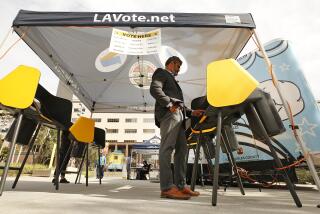PERSPECTIVE ON CHARITY : Doing Business With Scrooge : First Executive and Fred Carr turned their backs on community needs. Ironically, their fall leaves many in ruin.
At a recent meeting of the Western Region board of directors of United Way, it was pointed out that our fund-raising campaign in the Los Angeles area was running about $10 million behind our goal. The shortfall was blamed on the recession and a decline in corporate employee programs’ contributions. On the same day, the Los Angeles Times and the Wall Street Journal reported on the potential hardship to 400,000 Californians who had policies or annuities in the troubled First Executive Corp.
The coincidence of the two events reminded me of my own encounter with First Executive, a few years ago, when I tried to bring the firm and its chairman, Fred Carr, into the United Way fold.
The United Way board was reviewing a list of several prominent individuals and large corporations that had never contributed. I spotted the name of Fred Carr and First Executive. Since I had known Carr for many years and had business dealings with his firm, I volunteered to call on him. Many people don’t just give to charity; they have to be asked. Maybe First Executive had never been approached properly.
I took six pledge cards that day, and ended with five first-time contributors, one of whom later became United Way’s largest corporate contributor, another, one of the largest personal contributors. One of the corporate contributors was undergoing a severe restructuring and could easily have turned down my request. But only Fred Carr and First Executive did.
I was not asking for contributions to some obscure charity. United Way raises $90 million a year in Los Angeles to fund quality health and human-service programs. It has 50,000 volunteers in its fund-raising campaign. It supports 360 organizations that make Los Angeles a better place to live.
At that time, First Executive was a successful company with 1,100 employees. It had just reported earnings of $174.5 million, and Carr was one of the highest paid executives in California. I suggested three ways for First Executive to give back a little bit to the community: a personal gift, a corporate gift and/or allowing United Way to conduct an employee campaign. I struck out.
I am persistent. Besides following up on Carr, I discussed my frustration with two First Executive directors, one a former head of United Way’s general campaign, and the other a distinguished academician who was also on the Foothill Group board of directors. They agreed to make United Way an agenda item at the next First Executive directors meeting. These directors had been picked by Carr to enhance First Executive’s status in the community, and I knew he couldn’t turn them down.
He did.
I later called Carr and wrote to him, describing how the United Way campaign had been well-received by Foothill employees, how it had enhanced their image of Foothill and aroused their collective concern for the underprivileged in Los Angeles. . . all to no avail.
I could not accept, but I could understand, the reluctance of Carr and First Executive not to support United Way, but I could never understand why he would stand in the way of an employee campaign. This was especially disturbing because an estimated 25% of all workers or their families in Los Angeles County are assisted by United Way agencies and organizations. By that rule of thumb, 200 to 250 members of the First Executive family were already United Way beneficiaries.
This year, First Executive was able to muster more than $250,000 to pay lobbyists to protect its junk-bonds franchise and to frustrate regulators.
I began to wonder if there was a connection between First Executive’s insensitivity to the needs of the community and its own employees and policyholders, and the company’s ultimate demise.
Los Angeles can be an impersonal city, and some people see no need to help the general community. Yet all of the city’s major financial institutions have an exemplary record as United Way supporters. I have found, in checking the records, only two exceptions: First Executive and Columbia Savings. Ironically, both were seized by regulators. Both had chief executives who were the highest paid in their industry. Both spent an inordinate amount of money supporting politicians. Despite its now-infamous reputation, even Lincoln Savings & Loan supported United Way.
If First Executive, or for that matter Columbia Savings, were located in Milwaukee or Peoria, local pressure and civic pride would have forced them to be more community-minded. No doubt the firm contributed to charity, but stubbornness and arrogance wouldn’t allow them to be mainstream. Now Fred Carr and First Executive are outside the community. That wouldn’t matter, were it not for all the people who are now facing financial ruin because of them.


